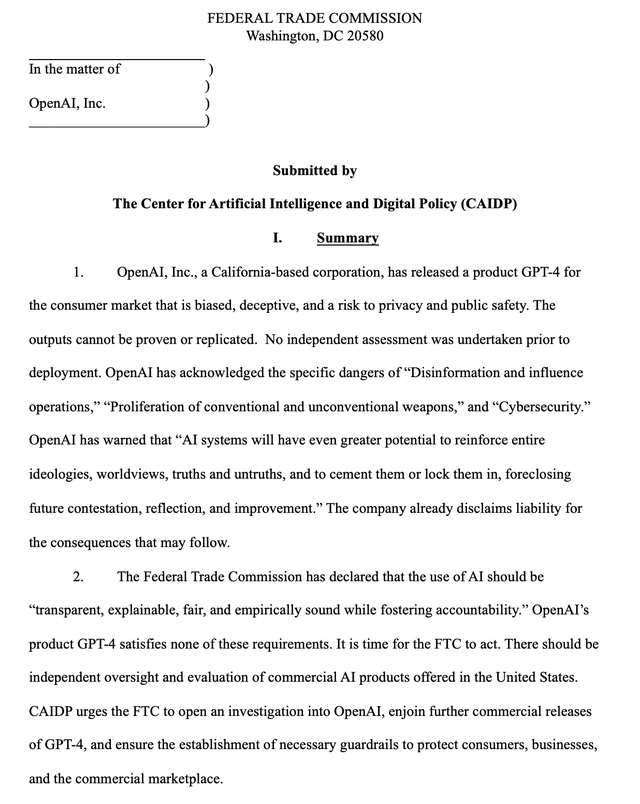followingMusk, Apple co-founders and others sign a joint open letterAfter calling for a moratorium on large-scale generative AI experiments (an open letter also signed by CAIDP chair Marc Rotenberg),Center for Artificial Intelligence and Digital Policy (CAIDP), a nonprofit research organization TowardsThe U.S. Federal Trade Commission (FTC) filed a complaint seekingInvestigate Open AI and its product ChatGPT.and asked the FTC to suspendRelease more new commercial versions of GPT,Until appropriate safeguards are established; at the same time apply to the FTC to regulate the generation of artificial intelligence industry.

CAIDP thinks Open AI breached consumer protection rules,Calling GPT-4 “biased, deceptive, and a risk to privacy and public safety.Outputs cannot be proven or reproduced, and were not independently evaluated prior to deployment.” And citing the FTC’s previous announcement that “the use of artificial intelligence should be transparent, explainable, fair, and empirically sound while promoting accountability.” Reasonable” means that GPT-4 does not meet any of the above requirements.
The content of the complaint lists the potential threats of GPT-4, including the possibility of malicious code and highly customized propaganda, and biased training data that may lead to recruitment and other aspects.stereotypeor unfair racial and gender preferences.
It also points out the OpenAI product interfaceSignificant Flaws in Privacy, and cited a recent vulnerability incident – exposing OpenAI ChatGPT history and possible payment details to other users. And “OpenAI released GPT-4 to the public for commercial use in full knowledge of these risks.”
CAIDP warns that ChatGPT will facilitate deceptive commercial claims and advertisements. The FTC should investigate OpenAI using the powers under Title 5 of the FTC Act to investigate, prosecute, and prohibit “unfair or deceptive acts or practices in or affecting commerce.”
The group claims that “the commercial release of GPT-4 violates Title 5 of the FTC Act, the FTC’s established guidelines for businesses using and promoting AI products, as well as emerging norms and leading experts and scientific associations for AI governance officially recognized by the U.S. government.” Recommended General Guidelines for AI”
CAIDP asked the FTC to halt any further commercial deployment of the GPT model and requested an independent evaluation of the model before any future rollout. as well as providing a publicly accessible reporting tool, similar to the one that allows consumers to file fraud complaints; and requiring the FTC to develop clear rules on the rules for generating artificial intelligence systems, building on the agency’s ongoing but still relatively Informal research and evaluation.
“We support growth and innovation. We recognize the wide-ranging opportunities and benefits that artificial intelligence may provide. However, unless we can maintain control of these systems, we will not be able to manage the resulting risks or potentially catastrophic consequences. We’re asking the FTC to “hit the pause button” so our agency, our laws, and our society have a chance to catch up. We need to assert agency over the technology we create before we lose control.”
#advocacy #group #asks #FTC #stop #releasing #OpenAI #GPT